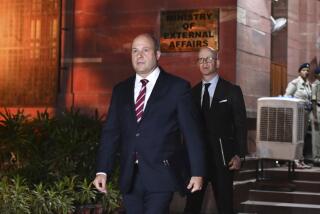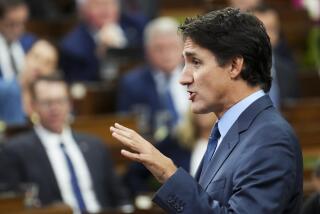Canada’s bilingual laws apply to tweets, too
Reporting from OTTAWA — The tweets earlier this year were mundane announcements about government policy.
The problem wasn’t what the government ministers said. It was how they said it.
Foreign Minister John Baird used English. Public Safety Minister Steven Blaney used French.
Under a Canadian law passed five decades ago, all communication emanating from or regulated by the federal government — from legislation to in-flight announcements on Air Canada flights — must appear in both languages.
Citizens complained about the tweets, prompting an investigation by Graham Fraser, whose full title is commissioner of official languages. He accused both ministers of breaking the law.
Other citizens rushed to their defense with a barrage of tweets calling the decision “stupid,” “crazy” and — in French — “absurde.”
“Only in Canada,” said another Twitter post.
See more of our top stories on Facebook >>
The matter appeared to die last month when a new government led by the Liberal Party took power and the old ministers, who belonged to the Conservative Party, lost their jobs.
But the changeover did not affect Fraser, who kept his position as language czar. This week he announced that he would monitor the new ministers’ tweets.
The new government is an unlikely target. The new prime minister, Justin Trudeau, is the son of Pierre Trudeau, who as prime minister 46 years ago introduced the controversial language law.
In his new job, Trudeau makes a point of tweeting in both languages, as do many of his ministers.
Nonetheless, the requirements of the law as it applies to social media are likely to remain a source of debate.
One key issue: Do tweets from a minister’s personal Twitter account have to be in both languages?
A spokesman for Fraser said if the tweets involve government policy or initiatives, they must be.
“Our view is that if you’re a minister and talking about your work as a minister, that information has to be made available in both official languages,” said the spokesman, Nelson Kalil.
At the same time, he acknowledged, there is room for interpretation.
For example, Scott Brison, the new minister in charge of the Treasury Board Secretariat, tweets mainly in English. But that’s allowed, Kalil said, because Brison is usually retweeting items that his department originally sent out in both languages.
One of the biggest critics of bilingual tweeting requirements is Tony Clement, who was head of the Treasury Board in the last government and came under fire from Fraser and others for often using only English on social media.
“The whole point of social media is spontaneity,” he said in an interview. “If tweets and Facebook postings and Instagram photos and Snapchat have to all be vetted and filtered through the official languages process, then there’s no point in engaging in social media for politicians.”
NEWSLETTER: Get the day’s top headlines from Times Editor Davan Maharaj >>
Clement, who remains a member of Parliament, said forcing ministers to always post in English and French is “ridiculous.”
“We’ve got really important issues to discuss of war and peace, and of economic prosperity and economic doom, and this is the item that captures the attention of the Ottawa bureaucracy?” he said. “I think they should leave well enough alone.”
Other officials suggested ministers should be allowed some flexibility, depending on what they tweet about. What they ate for lunch doesn’t matter, said Francois Choquette, a member of Parliament who serves as official languages critic for the opposition New Democratic Party and tweets only in French.
“If he or she is going to send out an important piece of information that has an impact on Canadians, that’s a different story,” he explained in an email.
The language law has been controversial since it took effect in 1969, both for the existential questions around national identity and the practical ones around paying to publish every federal document in two languages.
On several occasions, courts have forced government agencies to comply with the law after citizens filed lawsuits.
Of the nearly 36 million people in Canada, about a quarter speak French as their first language.
“Official bilingualism in Canada is the result of its two founding peoples — the English and the French,” said University of Ottawa law professor Pierre Foucher, an expert on the language law who says there is little doubt it covers social media.
Thierry Tardif, the 22-year-old spokesman for VoteNote, an app aimed at getting Canadians out to vote, said it was time for elected officials to stop wasting time on the debate and post in both languages.
“I’m a Francophone Quebecer and I primarily post in English on Facebook,” said Tardif, a graduate of English-speaking Concordia University in French-speaking Montreal. “However, if I were an elected official, I would post in both languages to avoid controversy.”
Guly is a special correspondent.
ALSO
Hong Kong netizens worry copyright bill will limit freedom of expression
Sanders gets his database access restored after supporters protest
Limited by U.S. banking rules, pot businesses rely on bags of cash and armed guards
More to Read
Sign up for Essential California
The most important California stories and recommendations in your inbox every morning.
You may occasionally receive promotional content from the Los Angeles Times.










